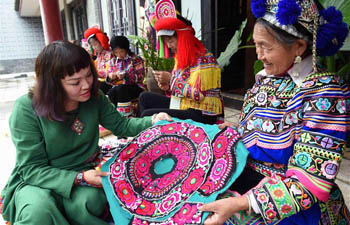HOHHOT, June 25 (Xinhua) -- On a hot summer day in Qinglongshan township, Naiman Banner, in northern China's Inner Mongolia Autonomous Region, villagers are coming to Zhao Maolin's lab to get virus-free sweet potato seedlings.
"We must hurry, or we will miss the best time to sow," Zhao said.
Zhao, 52, an associate researcher at the Institute of Genetics and Development Biology, Chinese Academy of Sciences, has been seeking ways to help local villagers get rid of poverty in Naiman Banner, Tongliao city.
Naiman, located in the hinterland of the Horqin Desert, is a national-level poverty-stricken area with 32,904 people living below the poverty line of 3,168 yuan (460 U.S. dollars).
"The virus-free seedlings helped increase the yield by 67 percent last year," Zhao said.
In July 2015, Zhao was stationed in Naiman as leader of an anti-poverty work group.
"I still remember the first few days when I arrived. I found that most sweet potatoes here were severely infected with a virus, and as a result, the yield was poor," he said. "But there was a great demand for the starch and noodles made from them."
Zhao soon established a research lab in the town, determined to develop high-yield virus-free seedlings and finally succeeded in April last year. He started with an experiment, planting 1,000 seedlings.
"We had a yield of 2,500 kg per mu (about 0.07 hectares) of land last year. In the past we only had 1,500 kg," said Zhang Yubao, a villager.
The seedlings are free for households registered as living below the poverty line.
With the help of the seedlings, the annual income of each household was estimated to increase by at least 6,000 yuan above the poverty line.
Qinglongshan township had 1,622 people living under the poverty line in 2016, but thanks to the virus-free seedlings, 282 of them are no longer in poverty.
"Villagers used to be quite conservative, but planting virus-free potatoes not only has helped them increase income, but also made them believe in the magic of science," Zhao said.
Teaching the villagers was difficult and attracting investors no easier. "We talked to more than ten companies and finally persuaded one of them to invest," he said.
With a deal signed last September, 2,000 hectares of sweet potatoes will be planted in the town this year, and a zone will be built to process potatoes into starch and noodles. Companies and supermarkets nearby will also purchase the potatoes.
"Science and technology can play a big role in poverty relief. We are trying to bring science and technology to the farmlands, adding vitality to local economic growth," said He Minghong, deputy director of the National Natural Science Foundation of China.
The foundation has provided a total of 35.2 million yuan (5.16 million U.S. dollars) and implemented a series of poverty relief projects in the county since 2003, such as bringing in improved cow breeds.
Zhao's two-year term will end in July, but he has applied to stay to serve another term.
"I want to further improve the seedling, push the potato processing zone into operation and witness that the villagers' dream of a better life comes true," he said.

















